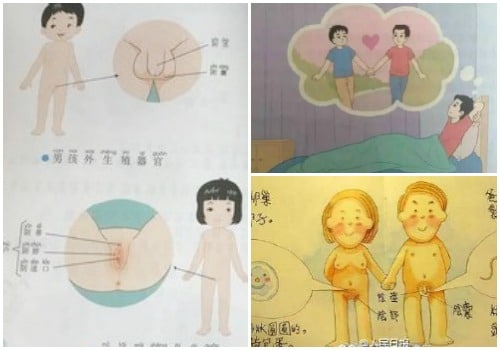In a Weibo post on July 28, Chinese state media outlet People’s Daily (@人民日报) warns parents to protect their children against sexual assault. The post was shared over 17.000 times on Weibo within a couple of hours. People’s Daily writes:
“Recently, the topic “sexual abuse of children” (儿童性侵) has again attracted people’s attention. From 2013 to 2016, the media have reported at least 1401 child sexual abuse cases, and in over 70% of these cases, it was an acquaintance who committing the crime. What is considered sexual abuse of children? What should parents do to protect their children from sexual harassment? Do not turn sex into a taboo [lit. “turn green at the mention of sex” 谈性色变]. The more they don’t know, the more dangerous it is for the children.”
The post comes with a series of images that instruct parents how to protect their children.
The first image says: “Parents should teach their children what is inappropriate behavior! Other people should not touch your intimate areas, even if seems fun.”

The infographics tell parents to be explicit to their children in what is considered inappropriate behavior, saying that other people should not show them images or films with naked people in them, and that it is not normal for people to take children into a separate room and touch their private parts.


Parents should also tell their children that it is not normal for other people to show them their private parts, or to kiss children against their will.

“Parents should let their children know: only mummy, daddy, or those who are very close to you can see your private parts; the nurses and doctors also can see – but only for helping you wash up, wipe your bottom, dress you, or check you at the doctor’s examining room when you are ill. As for other people, other times, or other places: IT IS NOT OKAY!”

The infographic also emphasizes that children should learn to say “NO!” in a loud voice against people who want to assault them.

People’s Daily tells parents to teach their children not to accept drinks from strangers, and not to let them go home by themselves if they are unable to pick them up. If someone tells their child not to tell something to their mummy and daddy, they should always tell their mummy or daddy about it.

Over 92% of reported child sexual abuse cases involved girls, the infographics say, and a little over 7% of cases involved boys. They warn parents not to disregard sexual abuse of boys, as it is often more taboo.
“This should be propagated in schools instead of on Weibo.”
Although many commenters on Weibo show their support for this campaign against sexual abuse, there are also many who point their finger to state media for propagating better sexual education for children, while often being conservative when it comes to sexual education textbooks in schools. “This should be propagated in schools instead of here,” some said.
Others also said the parents were to blame: “There’s just nothing to do about it when parents are unwilling to teach their children sexual education.”
Earlier this year, a sexual education textbook series for children drew controversy on Weibo for being too “explicit.”
The book, published by Beijing Normal University, shows pictures of reproductive organs and of two people having sex. It also teaches children about sexual abuse, homosexuality (both of gays and lesbians), and gender equality.

Some parents said they found the textbook “pornographic,” and called it “tasteless” and “vulgar.” Due to the rising controversy, the school that first used these books then withdrew them from their curriculum.
China’s first publication of a sexual education textbook for children came out in 2002, and in many parts of China it did not enter schools until 2003. According to China.org, however, most of these textbooks remained unused and/or unsold after their initial print. In 2007, schools in Shenzhen rejected the books.
From time to time, discussions on proper sexual education for children in China will flare up, usually with people on one side arguing it is inappropriate to teach young children about sex, while people on the other side saying that teaching children about sex at a young age can help them protect themselves against sexual abuse, HIV, and teen pregnancies.
“This is the whole reason why sexual education books should not be banned from primary schools,” one commenter responded to People’s Daily‘s campaign.
The Communist Youth League of Jilin also responded in the comment section saying: “We should reinforce sexual education for children to keep our children safe from harm.”
By Manya Koetse
Follow @whatsonweibo
©2017 Whatsonweibo. All rights reserved. Do not reproduce our content without permission – you can contact us at info@whatsonweibo.com.
The post People’s Daily: How to Protect Your Child from Sexual Assault appeared first on What's on Weibo.